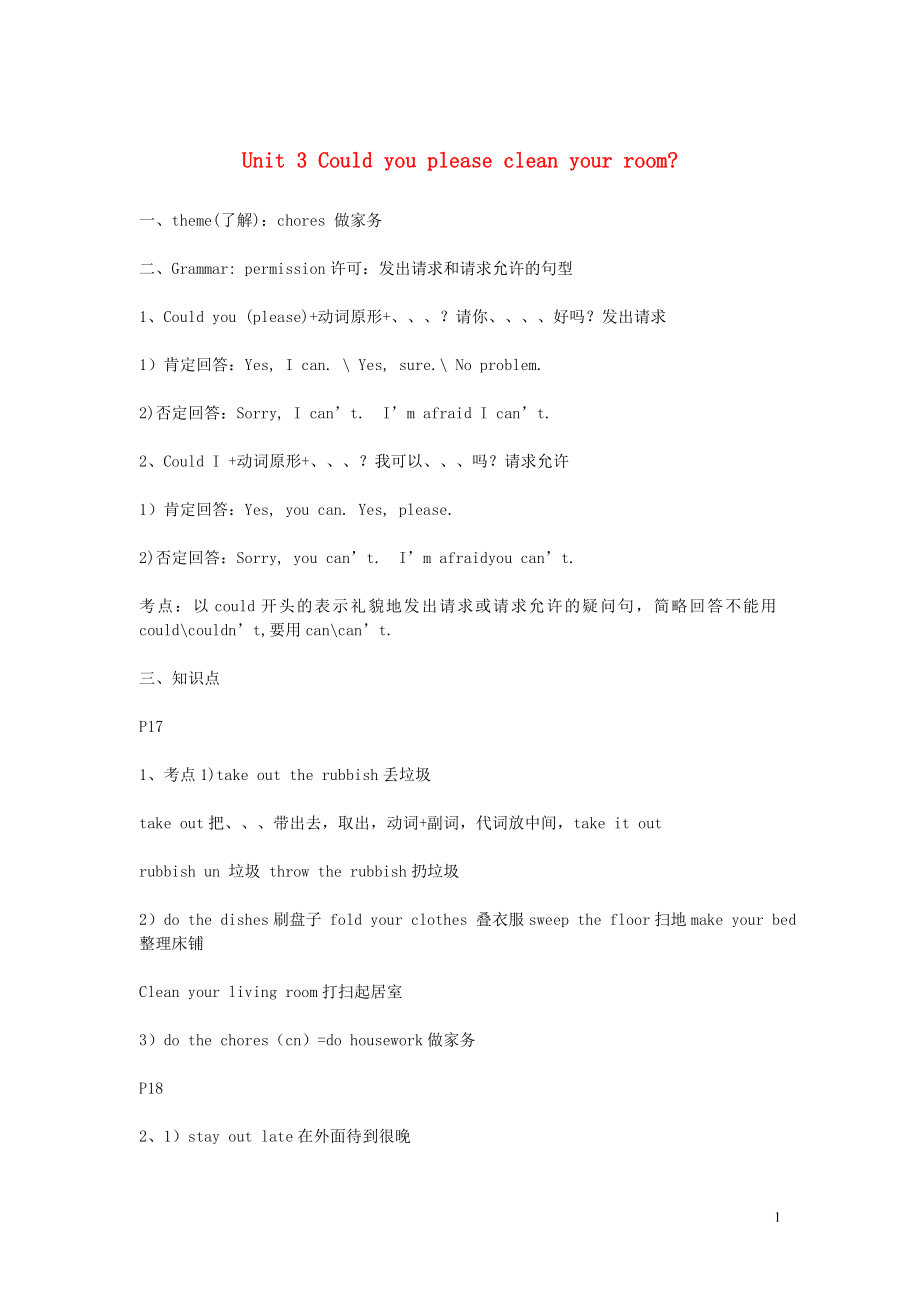《2019年八年級英語下冊 Unit 3 Could you please clean your room知識點(diǎn)總結(jié) (新版)人教新目標(biāo)版》由會員分享����,可在線閱讀,更多相關(guān)《2019年八年級英語下冊 Unit 3 Could you please clean your room知識點(diǎn)總結(jié) (新版)人教新目標(biāo)版(6頁珍藏版)》請在裝配圖網(wǎng)上搜索。
1��、Unit 3 Could you please clean your room?
一����、theme(了解):chores 做家務(wù)
二��、Grammar: permission許可:發(fā)出請求和請求允許的句型
1�����、Could you (please)+動詞原形+��、��、、���?請你�、���、���、��、好嗎�����?發(fā)出請求
1)肯定回答:Yes, I can. \ Yes, sure.\ No problem.
2)否定回答:Sorry, I can’t. I’m afraid I can’t.
2、Could I +動詞原形+、�、、�����?我可以��、���、���、嗎����?請求允許
1)肯定回答:Yes, you can. Yes,
2、please.
2)否定回答:Sorry, you can’t. I’m afraidyou can’t.
考點(diǎn):以could開頭的表示禮貌地發(fā)出請求或請求允許的疑問句�,簡略回答不能用could\couldn’t,要用can\can’t.
三、知識點(diǎn)
P17
1���、考點(diǎn)1)take out the rubbish丟垃圾
take out把�����、、、帶出去,取出�����,動詞+副詞�,代詞放中間���,take it out
rubbish un 垃圾 throw the rubbish扔垃圾
2)do the dishes刷盤子 fold your clothes 疊衣服sweep the flo
3����、or掃地make your bed整理床鋪
Clean your living room打掃起居室
3)do the chores(cn)=do housework做家務(wù)
P18
2�、1)stay out late在外面待到很晚
2)get a ride 搭便車 3)need to do sth 需要做某事(need實義動詞)need do sth(情態(tài)動詞)
4)have to do sth 不得不做某事
3、1)help (sb) out with sth幫助(某人)做某事(常指幫助某人擺脫困境)
2)at least至少
3)finish doing sth做完某事
4、
4、1)Two hours of TV isenough for you.
短語(名詞短語��、現(xiàn)在分詞短語�、不定式短語)作主語���,謂語動詞用單數(shù)�����。
2)any minute now 隨時
5�、she won’t be happy if she sees this mess.
1)當(dāng)主句是一般將來時,條件狀語從句和時間狀語從句用一般現(xiàn)在時表示將來��。
2)mess cn 雜亂in a mess ; messy adj. 雜亂的
3)clean and tidy 干凈整潔的
P19
6、1)throw down 扔下 throw-threw-thrown 扔,擲
2) The m
5�、inute I sat down in front of the TV, my mom came over. 我一坐到電視劇前面,我媽媽就過來了����。
(1)the minute一、、����、就=as soon as =the moment 引導(dǎo)時間狀語從句(主將從現(xiàn))
(2)in front of和in the front of: in front of 在�����、�、�����、前面(范圍外)��;in the front of 在���、�、���、前部(范圍內(nèi))
(3)come over 過來���,順便拜訪
7���、1)take a dog for a walk 遛狗
2)生氣:anger(n)-angry(adj.)-angr
6�、ily(adv.)
3)all the time總是,一直���; all day整天�����; all evening 整夜
8�����、I’m just as tired as you are.=You are tired, but I am tired, too. 我和你一樣累��。
as+adj或adv.原級+as: 和����、�����、�����、一樣,否定結(jié)構(gòu):not as\as+adj或adv.原級+as: 不如
9�、she did not do any housework and neither did I. 她沒做任何家務(wù),我也沒做。
Neither 兩者都不
1)neither+系動\助動\情動+主語=賓語+n
7、either:neither did I=Me neither, 也不(前面的否定情況也適合后者),反義詞so+系動\助動\情動+主語(主格)=賓語+too: so did I=me too
2)neither of+cn(pl):作主語時,謂語動詞一般用單數(shù)���,但是口語常用復(fù)數(shù)。
Neither of the answers is right, 兩個答案都不對��。
3)neither nor 都不,連接兩個并列的主語�����,謂語動詞就近原則����。
Neither my mom norIlike red. = Neither I nor my momlikes red.
10、1)in surpr
8��、ise驚訝地 to one’s surprise 讓某人驚訝的是�、����、�、
2)show n 節(jié)目 v 展示,說明
P20
11、1)hang out閑逛
2)pass sb sth=pass sth to sb 把某物遞給某人
3)Could I borrow that book? Could you lend me some money?
(1)borrow�、lend和keep: borrow借入���, borrow sth from sb 從某人那里借某物��;lend借出�����,lend sth to sb=lend sb sth 借某物給某人����;borrow和lend為非延續(xù)性動詞��,借多久
9���、用keep.
12��、1)hate to do sth=hate doing sth 討厭做某事
2)I’ll finish my homework while you help me with the dishes. 當(dāng)你幫我洗餐具的時候��,我將完成作業(yè)��。
While 連詞����,當(dāng)�、��、����、的時候,引導(dǎo)時間狀語從句��,謂語動詞必須用延續(xù)性的�;主將從現(xiàn)���。
P21
13、1)drink cn 飲料snack cn 點(diǎn)心���,小吃
2)invite sb to+地點(diǎn)、活動:邀請某人去某地或參加某活動
Invite sb to do sth 邀請某人做某事
P22
14�、1)make\let sb
10��、do sth讓某人做某事
2)have time to do sth 有時間做某事
3)Housework is waste of their time.
Waste cn 浪費(fèi) a waste of 浪費(fèi)���、���、�����、a waste of time\money\water\food浪費(fèi)時間��、錢����、水��、食物
V waste time\money on sth=waste time\money(in) doing sth 浪費(fèi)時間、金錢做某事
15、They should spend their time on schoolwork in order to get good grades and
11���、 get into a good university.為了取得好的成績����,并進(jìn)入好的大學(xué)���,他們應(yīng)該把時間用在學(xué)業(yè)上�。
1)花費(fèi):spend, pay, cost, and take
Spend:sb spend time\money on sth\ doing sth某人花費(fèi)時間、金錢做某事
Pay: sbpay somemoneyfor sth 某人付錢買某物
Cost: sth cost (sb) some money某物花費(fèi)某人多少錢
Take:it takes sb some timeto do sth 做某事話費(fèi)多少時間
Spend時間和金錢��;pay, cost金錢��;ta
12��、ke時間
2)in order to +do(短語)為了,目的是=in order that+從句����,否定:in order not to
16、when they get older, they will have to do housework so there is no need for them to do it now.當(dāng)他們長大后����,他們將不得不做家務(wù)���,所以他們現(xiàn)在沒有必要做家務(wù)���。
1)get older 長大 do housework 做家務(wù)
2)there is no need for sb to do sth 對某人來說沒有必要做某事(need un 必要)
17
13�����、、It’s parents’ job to provide a clean and comfortableenvironment at home for their children. 在家里給孩子提供一個干凈而舒適的環(huán)境是父母職責(zé)。
1)it作形式主語�,真正的主語是動詞不定式to provide
2)provide sth for sb=provide sb with sth為某人提供某物
18�����、1)doing chores is not so difficult. 現(xiàn)在分詞短語作主語�����,謂語動詞用單數(shù)�����。
2)mind doing sth介意做某事
19���、I think it is
14�����、important for children to learn how to do chores. 我認(rèn)為對孩子們來說學(xué)習(xí)如何做家務(wù)是很重要的�。
1)it is +adj. +(for sb) to do sth (對某人來說)做某事是、�����、、、的�����,it形式主語�����,動詞不定式是真正的主語����。
2)how(疑問詞)+to do 作賓語
20、Children these days depend on their parents too much. 現(xiàn)在的孩子太依賴父母。
1)these days 現(xiàn)在的
2)depend on依賴,取決于
3)too much修飾動詞
21、Doing
15��、chores helps to develop children’s independence and teaches them how to look after themselves.做家務(wù)有助于培養(yǎng)孩子的獨(dú)立性和教他們?nèi)绾握疹欁约骸?
1)develop children’s independence 培養(yǎng)孩子的獨(dú)立性
Develop v 培養(yǎng)�,發(fā)展���;development un 發(fā)展�;developing adj. 發(fā)展中的�����;developed adj. 發(fā)達(dá)的
Independence un 獨(dú)立---independent adj. 獨(dú)立的
2)teach sb how to
16��、 do sth教某人如何做某事
3)look after=take care of =care for照顧
22、Since they live in one house with their parents, they should know that everyone should do their part in keeping it clean and tidy. 既然他們和父母住在同一屋檐下,他們就應(yīng)該知道每個人應(yīng)該盡自己的職責(zé)來保持房子的
干凈整潔�����。
1)since 連詞,既然,由于�����,因為
2)do one’s part in doing sth盡自己的職責(zé)做某事
3)
17、keep clean and tidy保持干凈整潔
23��、1)he had no idea how to take care of himself, 他不知道如何照顧自己
Have no idea=don’t know 不知道
2)as a result結(jié)果 3)fall ill生病 4)drop 下降 dropped
24、The earlier kids learn to be independent, the better it is for their future .孩子越早學(xué)會獨(dú)立���,對他們的將來越好。
The earlier, the better 越早越好the+adj.比較級�����,the+adj.比較級:越�����、、���、越
6
 2019年八年級英語下冊 Unit 3 Could you please clean your room知識點(diǎn)總結(jié) (新版)人教新目標(biāo)版
2019年八年級英語下冊 Unit 3 Could you please clean your room知識點(diǎn)總結(jié) (新版)人教新目標(biāo)版

